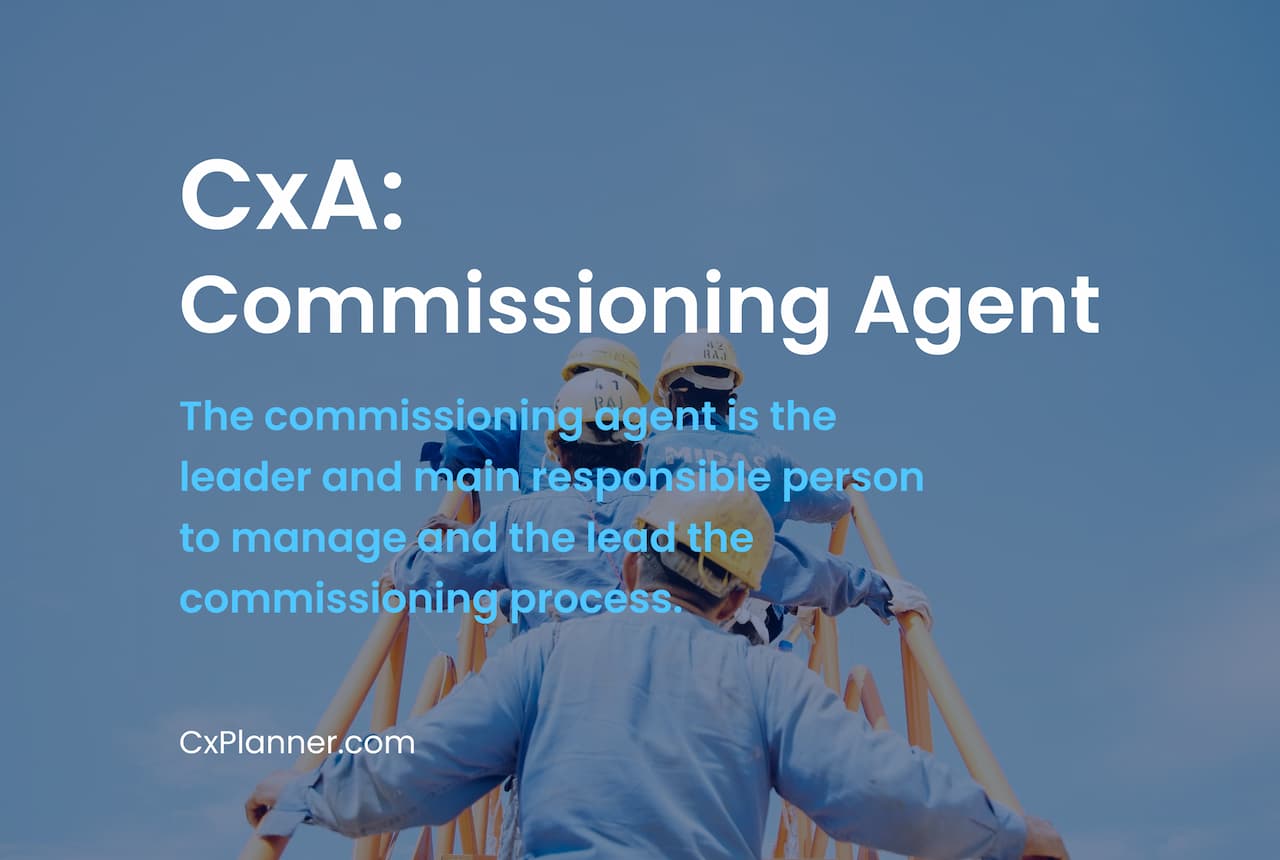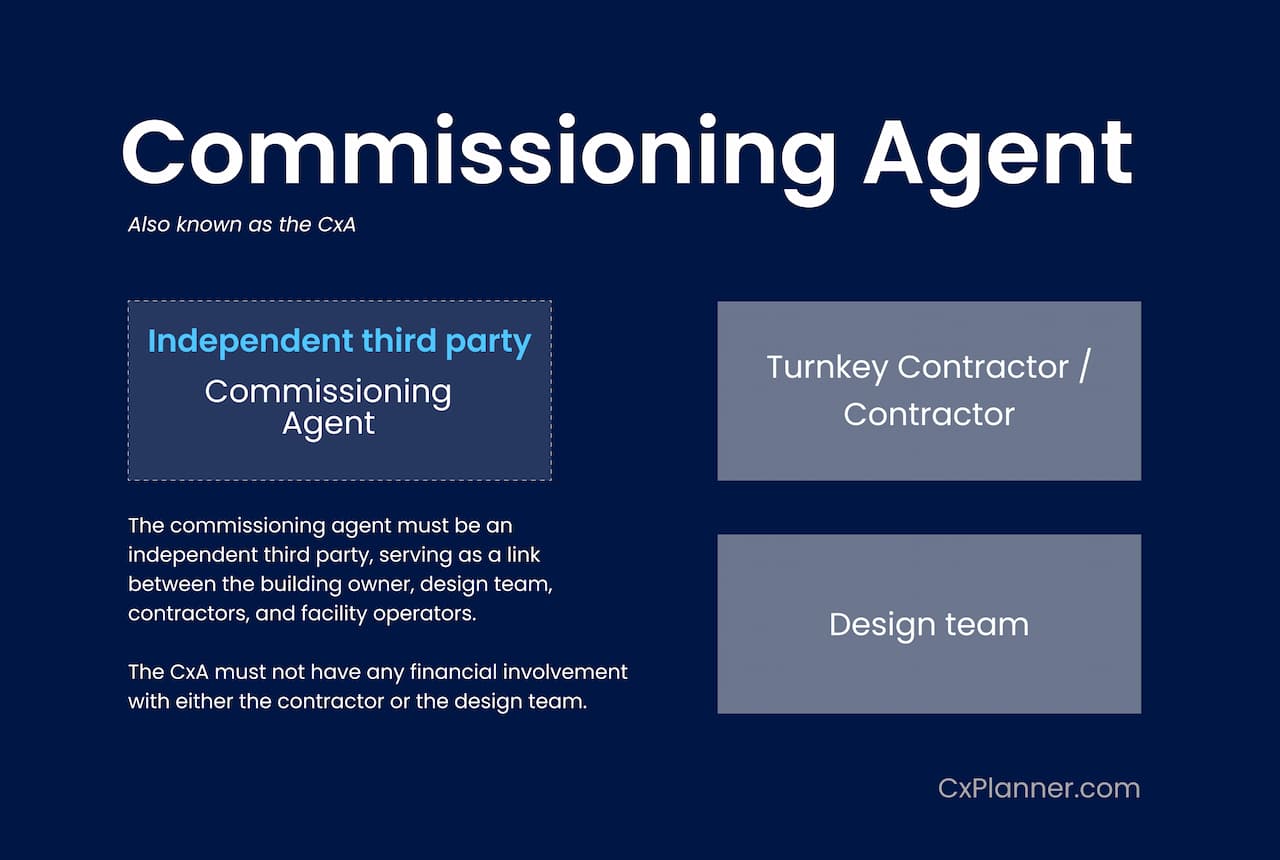
Table of content
 Introduction to the CxA
Introduction to the CxA
In the complex world of modern building design and construction, ensuring that a building's systems operate efficiently and effectively is of paramount importance. This task falls into the capable hands of a Commissioning Agent, often referred to as a CxA.
This article delves into the pivotal role of a Commissioning Agent, outlining who they are, their responsibilities, and the crucial job they perform in the realm of building commissioning.
 Who is a Commissioning Agent (CxA)?
Who is a Commissioning Agent (CxA)?
A Commissioning Agent, abbreviated as CxA, is a highly specialized and trained professional responsible for overseeing the commissioning process in construction projects.
Commissioning is a systematic quality assurance process that ensures building systems and components function optimally according to the owner's project requirements (OPR) and design specifications.
The Commissioning Agent acts as an independent third party, providing a critical link between the various stakeholders involved in the project, including the building owner, design team, contractors, and facility operators. Their primary role is to manage the commissioning process.

 The Difference Between a Commissioning Agent (CxA) and a Commissioning Authority
The Difference Between a Commissioning Agent (CxA) and a Commissioning Authority
The terms "Commissioning Agent" (CxA) and "Commissioning Authority" are often used interchangeably, leading to confusion. While they share similarities, it's essential to understand the distinction between these roles:
Commissioning Agent (CxA):
A Commissioning Agent, abbreviated as CxA, is a highly specialized professional responsible for overseeing and managing the commissioning process in construction projects.
Their primary focus is on ensuring that building systems meet project requirements, design specifications, and industry standards. Key responsibilities of a CxA include quality assurance, energy efficiency optimization, issue resolution, and long-term performance monitoring.
Commissioning Authority:
A Commissioning Authority, often referred to as a CxA as well, is a role that encompasses broader responsibilities beyond those of a Commissioning Agent. While a Commissioning Agent primarily focuses on project-specific commissioning tasks, a Commissioning Authority may take on a more comprehensive oversight role.
Commissioning Authorities often have a higher level of involvement in developing commissioning standards, guidelines, and strategies. They may oversee multiple projects, set commissioning policies, and ensure consistency in commissioning processes across an organization or industry.
In summary, a Commissioning Agent typically handles the day-to-day commissioning tasks for a specific project, while a Commissioning Authority may have a broader organizational or industry-wide role in shaping commissioning practices and standards.
 Responsibilities of a Commissioning Agent (CxA)
Responsibilities of a Commissioning Agent (CxA)
The responsibilities of a Commissioning Agent are multifaceted and encompass a wide range of activities throughout the project's lifecycle. Here are the key responsibilities of a CxA:
1. Planning and Coordination:
One of the initial tasks of a Commissioning Agent is to develop a comprehensive Commissioning Plan. This plan outlines the scope, objectives, and strategies for commissioning activities. It serves as a roadmap for the entire commissioning process and ensures that all stakeholders are aligned with the goals.
2. Design Review:
The CxA conducts a thorough review of the project's design documents to identify potential issues, discrepancies, or inefficiencies that could impact the building's performance. This includes a review of the HVAC (Heating, Ventilation, and Air Conditioning), electrical, plumbing, and control systems.
A key part in the commissioning review process is to verify that systems work across different disciplines. For example, how the design of an AHU works with BMS-system.
3. Submittal Review:
During the construction phase, the Commissioning Agent reviews and approves equipment and materials submittals to ensure they meet the project requirements and design specifications. This step helps prevent the installation of non-compliant or subpar components.
4. Test, Site Inspection, Coordination:
Commissioning Agents perform tests, site inspections, and coordinate activities to ensure that building systems are operating optimally. These tasks are crucial for ensuring the quality and performance of the constructed systems.
 A Commissioning Agent's Role in LEED Commissioning
A Commissioning Agent's Role in LEED Commissioning
Commissioning Agents also play a significant role in LEED (Leadership in Energy and Environmental Design) commissioning, contributing to sustainable and energy-efficient building practices.
LEED requirements are divided into nine different credit categories. In order to achieve credits in a specific category, all of the prerequisites must be met first.
For example, LEED commissioning credits in the Energy and Atmosphere category have prerequisites in Fundamental Commissioning and credit opportunities in Enhanced Commissioning, worth up to 6 points towards LEED certification.
 Management of Commissioning Activities
Management of Commissioning Activities
Effective management is essential in commissioning projects, and a Commissioning Agent (CxA) plays a crucial role in overseeing and coordinating these activities. The CxA is responsible for managing all aspects of the commissioning process, ensuring that it proceeds smoothly and efficiently. To facilitate this management, dedicated commissioning software tools are often employed.
Modern commissioning projects involve a multitude of tasks, documentation, and coordination among various stakeholders, including design teams, contractors, and facility operators. Using traditional methods, such as Excel spreadsheets or paper-based documentation, can increase the risk of errors, oversights, and communication breakdowns.
By leveraging dedicated commissioning software, the CxA can streamline and centralize many aspects of the process. These software solutions often include features for:
- Project Planning: Creating detailed commissioning plans, defining project milestones, and setting clear objectives.
- Document Management: Storing and organizing project documents, including design specifications, equipment submittals, and commissioning reports.
- Task Tracking: Assigning and monitoring tasks to ensure that all commissioning activities are completed on schedule.
- Communication: Facilitating communication among project stakeholders and providing a centralized platform for discussions and issue resolution.
- Quality Assurance: Implementing quality control checks and verification processes to ensure that systems meet project requirements.
Utilizing commissioning software not only enhances project management but also contributes to the accuracy and reliability of the commissioning process. It allows for real-time tracking of progress, instant access to critical project data, and the ability to generate comprehensive reports.
Furthermore, the use of digital tools like CxPlanner not only improves efficiency but also enhances data security and ensures that all commissioning activities are documented, reducing the risk of overlooking critical steps in the process.
Ultimately, effective management of commissioning activities, supported by dedicated software solutions, is integral to the success of a commissioning project and the long-term performance of building systems.
 The Importance of a Commissioning Agent (CxA)
The Importance of a Commissioning Agent (CxA)
The role of a Commissioning Agent is critical for several reasons:
1. Quality Assurance:
The CxA serves as an independent quality assurance authority, helping to ensure that building systems are designed, installed, and operated correctly. This reduces the likelihood of errors, omissions, and costly rework.
2. Energy Efficiency:
Commissioning Agents play a key role in optimizing the energy efficiency of building systems. They ensure that HVAC, lighting, and control systems are calibrated to operate at peak efficiency, resulting in reduced energy consumption and lower operating costs over the life of the building.
3. Comfort and Indoor Air Quality:
Occupant comfort and indoor air quality are essential for any building. CxAs verify that HVAC systems provide consistent temperature control and adequate ventilation, creating a comfortable and healthy environment for building occupants.
4. Compliance with Standards:
Buildings must meet various industry standards, codes, and regulations. CxAs ensure that building systems comply with these requirements, reducing the risk of non-compliance issues and potential legal ramifications.
5. Troubleshooting and Issue Resolution:
Throughout the construction process and beyond, issues can arise with building systems. CxAs are skilled problem solvers who can identify, diagnose, and resolve issues efficiently, minimizing downtime and disruptions.
6. Long-Term Performance:
Building performance isn't just about the initial design and construction; it's about long-term sustainability. CxAs contribute to the longevity of building systems by conducting regular assessments and addressing maintenance needs, ensuring systems operate optimally throughout their lifecycle.